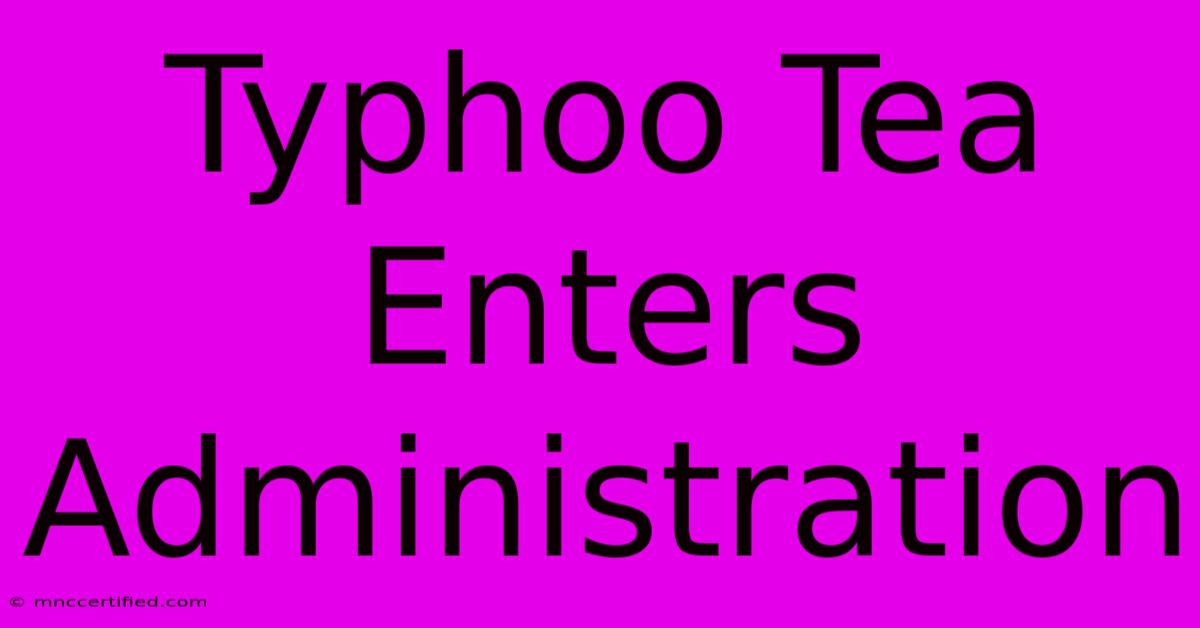Typhoo Tea Enters Administration

Table of Contents
Typhoo Tea Enters Administration: What Happens Now?
The news that Typhoo Tea, a beloved British brand, has entered administration sent shockwaves through the industry and beyond. For many, a cup of Typhoo represents a comforting ritual, a familiar taste of home. This article explores the implications of Typhoo's administration, examines potential causes, and considers what the future might hold for this iconic tea brand.
Understanding Administration
Before diving into the specifics of Typhoo's situation, it's crucial to understand what "administration" means in a business context. It's a formal insolvency process, similar to bankruptcy in the US, designed to protect a company's assets while attempting to find a way to rescue it or sell off its parts. The administrators—appointed insolvency practitioners—take control of the company's operations and try to maximize the return for creditors. This process differs from liquidation, where the company is wound up and its assets sold off.
Key takeaways about administration:
- Restructuring: The primary aim is often to restructure the business to make it viable again.
- Sale: Another possibility is a sale of the company or its assets to another buyer.
- Liquidation: If no viable solution is found, administration can lead to liquidation.
Potential Causes of Typhoo's Financial Difficulties
While the exact reasons behind Typhoo's administration haven't been fully disclosed, several factors likely contributed:
- Rising Costs: The cost of raw materials, such as tea leaves and packaging, has increased significantly in recent years, impacting profit margins. Inflation and supply chain disruptions have undoubtedly played a role.
- Increased Competition: The tea market is fiercely competitive, with both established brands and new entrants vying for market share. Typhoo may have struggled to maintain its position in a changing landscape.
- Changing Consumer Preferences: Consumer tastes are evolving, with increased demand for specialty teas and ethically sourced products. Typhoo might have been slow to adapt to these trends.
- Debt: High levels of debt can make a business vulnerable to economic downturns and make it difficult to invest in growth or weather challenging periods.
What Happens Next for Typhoo Tea?
The immediate future of Typhoo remains uncertain. The administrators will be working to:
- Assess the company's assets: This involves evaluating the brand value, manufacturing facilities, distribution networks, and intellectual property.
- Explore potential buyers: They will likely seek offers from interested parties, potentially including other tea companies or private equity firms.
- Negotiate with creditors: Discussions with creditors will be crucial to determine the best course of action for repayment.
The Impact on Consumers and Employees
The situation is concerning for both Typhoo's employees and its loyal customers. Job security for employees is naturally a major concern, and the future availability of Typhoo tea on shelves remains to be seen. However, a sale to a new owner could potentially safeguard jobs and maintain the supply of this iconic brand.
The Future of Typhoo Tea: Hope Remains
Despite the current challenges, there's still hope for Typhoo Tea. The brand holds significant recognition and consumer loyalty. A successful sale or restructuring could see Typhoo emerge stronger and better adapted to the modern market. The coming weeks and months will be crucial in determining the outcome. The administrators' efforts will be key in securing the best possible future for this well-loved British brand. We will continue to monitor developments and provide updates as they become available.

Thank you for visiting our website wich cover about Typhoo Tea Enters Administration. We hope the information provided has been useful to you. Feel free to contact us if you have any questions or need further assistance. See you next time and dont miss to bookmark.
Featured Posts
-
Goodlad And Swank Insurance Llc
Nov 29, 2024
-
Latest On Gregg Wallace Master Chef Announcement
Nov 29, 2024
-
Lions Bears Special Shared Opinions
Nov 29, 2024
-
Dentures Covered By Insurance
Nov 29, 2024
-
Jenkyns Joins Reform Uk Party
Nov 29, 2024